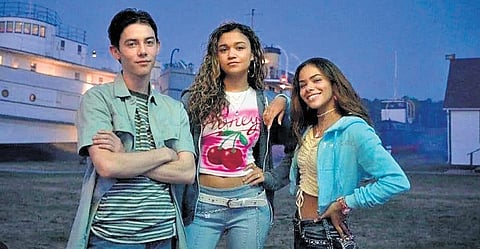'Time Cut' movie review: Nonsensically nostalgic
Netflix’s latest science-fiction film Time Cut begins with protagonist Lucy (Madison Bailey) saying, “What happens when a bright, shining star dies? It creates a big black hole.” With this line, the film bursts onto the scene with an intriguing premise: a time-travel adventure that lands smack-dab in the early 2000s. For some, this may spark a thrill of nostalgia—a yearning for simpler times of flip phones and dial-up internet.
But, much like that era, where technological advances seem inadequate by today’s standards, Time Cut fails to deliver a truly satisfying experience.
The film explores an interesting concept: the overprotectiveness shown towards younger siblings after a tragedy strikes the older one. Lucy travels back in time to prevent her sister’s death.
Though her time-travel journey is unplanned, she soon embraces it, realising her own independence after meeting her sister, Summer (Antonia Gentry) in the past. Until then, her parents were so protective that they even discouraged her to go for a NASA internship.
This dynamic is relatable, and the film cleverly portrays how such overprotectiveness can stifle a younger sibling’s growth.
The early 2000s are depicted delightfully. In one scene, Lucy mistakes the screech of a modem’s dial-up connection for a malfunction—a perfect nod to the quirks of the era’s technology. Similarly, she and her friend Quinn’s (Griffin Gluck) amazement at a smartphone’s multifunctional capabilities brings a smile. These moments humorously capture the nostalgia of a bygone era.
However, Time Cut stumbles when it comes to logic. Having travelled back in time to save her sister, Lucy employs some questionable tactics. Instead of alerting the authorities to prevent a serial killer’s attack, she and her friends try to prevent the attack themselves and narrowly escape.
The film’s ending is equally perplexing. After altering the timeline so drastically that she ceases to exist in the present, Lucy decides to start a new life in 2003—a time when she wasn’t even born.
This raises countless questions: How does she manage without identification or a documented past? She supposedly gets that NASA internship, but on what basis? The writers seem to have discarded logic in favour of a hastily constructed conclusion.
Even within its sci-fi framework, Time Cut barely scratches the surface. When Quinn warns that changing the past could disrupt the time-space continuum, perhaps even wiping out humanity, Lucy ignores him and alters the past anyway.
But the film never explores whether her actions actually affect the present. Time Cut’s illogical plot choices and unsatisfying ending leave a sour taste. Much like that modem’s screech, it serves as a reminder of a time best left in the past.

